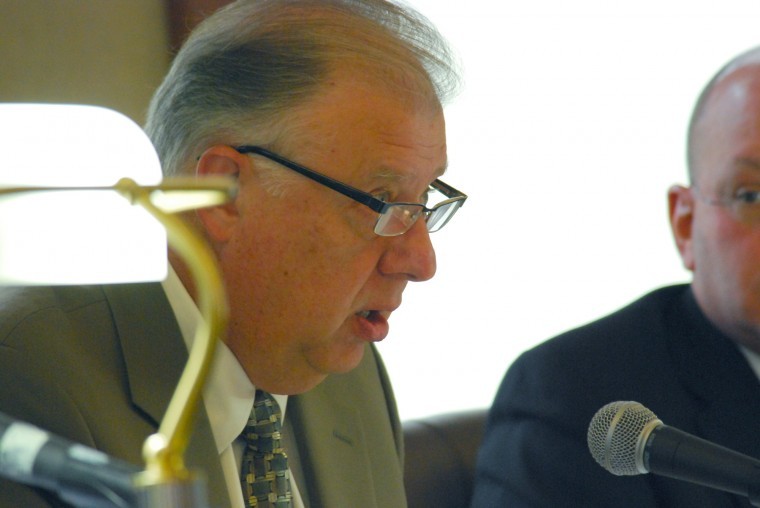Changes to employee health care, pensions are certain, Peters says
March 24, 2011
DeKALB | NIU President John Peters said the funding of next year’s budget, along with the employee health care and pension programs, is unsure. But it doesn’t look good.
“The state remains in dire financial strait,” Peters said to the Board of Trustees on Thursday. “Fiscal Year 2012 will likely be another round of tightening our belts and doing more with less.”
But it’s too early to predict how much less, he said.
Illinois currently owes NIU about $65.2 million. The last payment was received March 4.
“State cash flow delays are potentially devastating to operations and quality programming,” Peters said.
In FY2011, NIU received less money from the state than it did in 1999, Peters said, and operating costs are increasing. Utility costs have increased 126 percent since 1998.
The situation is not unique to NIU. It is a phenomenon at state schools across Illinois, he said.
The FY2011 operating budget for NIU is about $438 million, Peters said. $100.8 million is funded by the state, and about $141 million is funded by tuition and fees.
Peters said currently half of NIU’s operating budget is designated for specific purposes, making it difficult for NIU to spend the money where it needs it most.
Even though fees have increased, Peters said, NIU tuition and fees remain 11 percent below the statewide average. Instructional costs are 7.2 percent below the state average.
Peters said NIU is important to the economy of Illinois even though NIU is increasingly unable to rely on the state.
Over 85 percent of NIU alumni since 1993 have remained in Illinois, earning more than $3.8 million in income, contributing $114 million in income tax and an additional $8 billion in gross domestic product for the Illinois economy.
Peters said he is confident NIU has a “bright future” and will continue to be able to put students first.
“Change is a certainty, but with change comes opportunity, and NIU will emerge from this, hopefully as a stronger institution,” he said.
Peters said he is certain that changes to employee health care and pension programs will also be coming soon.
“More ominous [than budget reductions] are the ongoing and escalating discussions about pension reform for current employees and possible changes to health benefits,” Peters said. “What happens in Springfield in the next 60 days will be of critical importance to every employee..the decisions made by the General Assembly and the governor…will be felt by us for years to come.”
Peters said it is too early to tell what changes will be made, but options under discussion are increased employee pension contributions from the current 9 percent to as much as 20 percent and replacing the benefit plan with a plan similar to a corporate 401k.
Another option under discussion in Springfield is increasing the retirement age and making the changes in how benefits are calculated effective not for just new retirees, but all people receiving pensions.
“[Those options] have two things in common: decreased future benefits and increased cost to employees,” Peters said.
Other changes under consideration that would affect NIU employees are increasing insurance contributions, compelling retirees to pay for health insurance, taxing retirement benefits, recalculating cost of living increases, reviewing granting of sabbatical leaves for public universities and eliminating partial tuition waivers for dependents of university employees.
“That’s all pretty sobering.” Peters said. “[These issues] are not going to go away.”
Peters said the pension system in Illinois faces a shortfall of $82 billion, a figure that is expected to grow to a shortfall of $130 billion by 2030.
But the pension system may not even make it that long. Some experts say the system could collapse within the decade if changes are not made, Peters said.
“It is unfair to lay this problem at the feet of employees,” Peters said. “After all, in the history of the Illinois pension system…employees have never failed to pay their share on time. Politicians, however, have repeatedly chosen to defer their constitutionally-required contributions.”
Peters said he is committed to protecting the core benefits university employees rely upon. He said NIU administrators are collaborating with other university administrations on proposals to submit to the General Assembly.
Peters has also appointed a pensions advisory committee comprised of faculty, staff and pension experts to assist the administrators in the proposal process.
“I assure you that NIU has been, will be active in the discussion on these matters,” he said.







